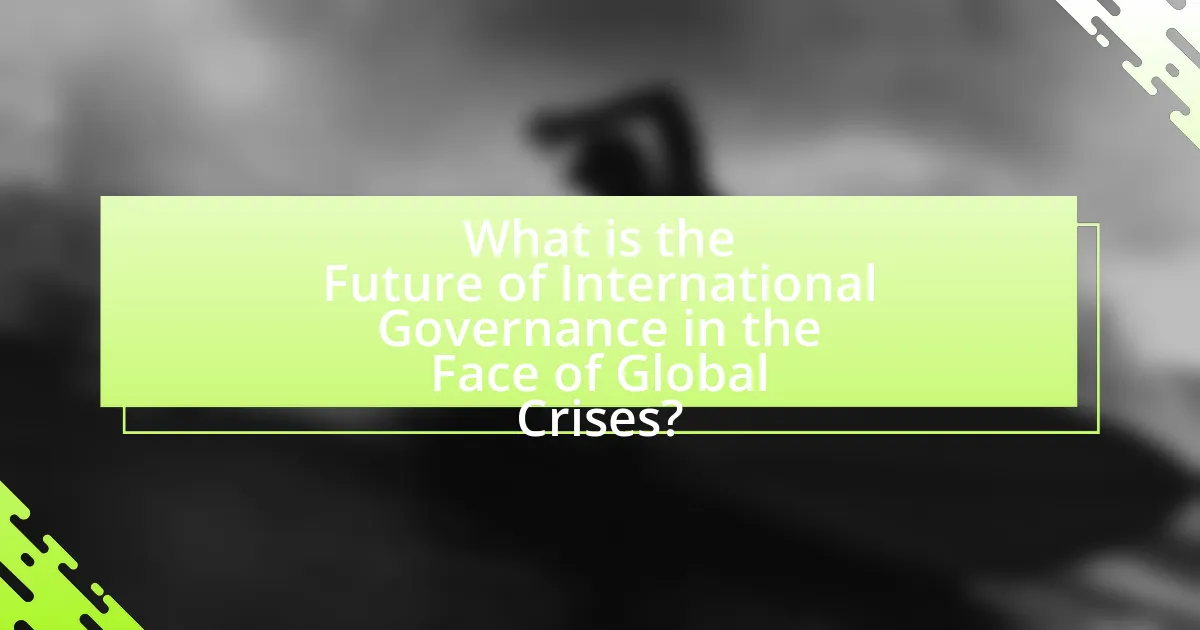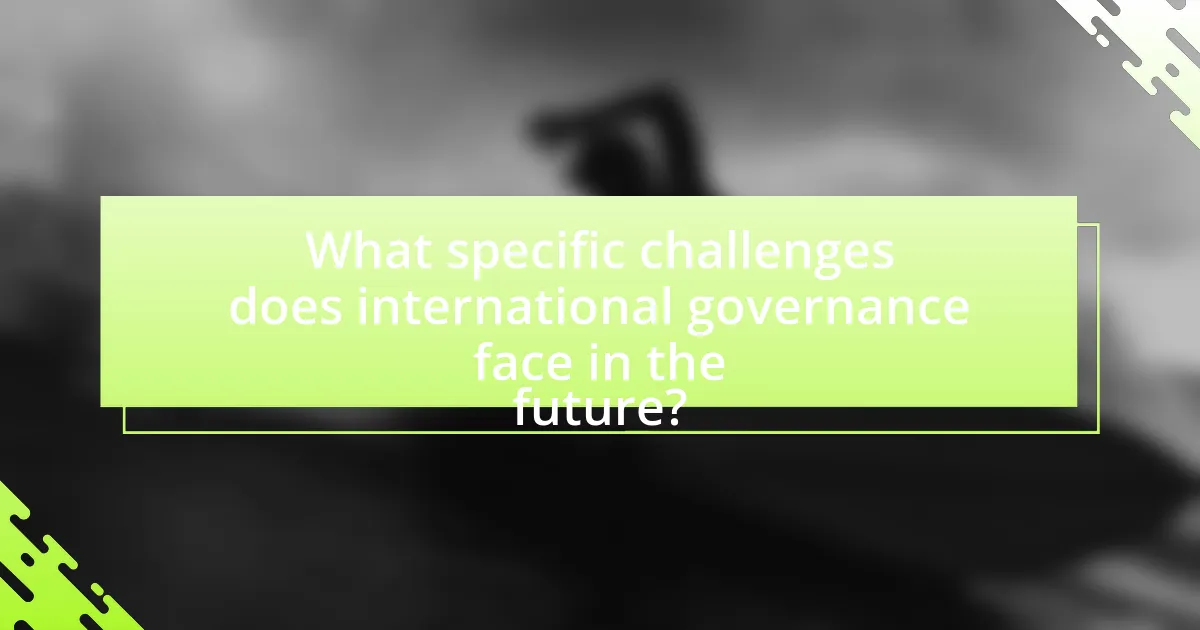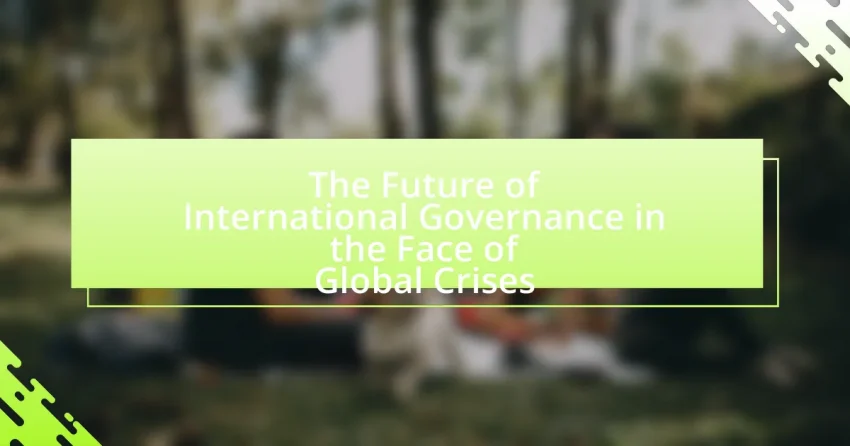The article examines the future of international governance in the context of global crises, emphasizing the necessity for multilateral cooperation and adaptive frameworks. It highlights how crises such as the COVID-19 pandemic and climate change have reshaped governance structures, revealing the limitations of existing frameworks and the importance of collective decision-making. Key challenges include rising nationalism, technological disruption, and the need for inclusivity in governance processes. The article also discusses emerging trends, effective governance strategies, and best practices that can enhance international cooperation and resilience in addressing complex global issues.

What is the Future of International Governance in the Face of Global Crises?
The future of international governance in the face of global crises will increasingly rely on multilateral cooperation and adaptive frameworks. As evidenced by the COVID-19 pandemic, global challenges require coordinated responses, leading to a shift towards more integrated governance structures. For instance, the World Health Organization’s role in managing health crises has highlighted the necessity for stronger international health regulations and collaborative research initiatives. Additionally, climate change negotiations, such as the Paris Agreement, demonstrate the need for binding commitments and accountability mechanisms among nations to address environmental crises effectively. These examples underscore that the evolution of international governance will focus on enhancing collaboration, transparency, and resilience to tackle complex global issues.
How do global crises impact international governance?
Global crises significantly impact international governance by necessitating coordinated responses among nations, which often leads to the strengthening of multilateral institutions. For instance, the COVID-19 pandemic prompted countries to collaborate through organizations like the World Health Organization, highlighting the need for global health governance frameworks. Additionally, crises such as climate change and geopolitical conflicts have driven nations to negotiate treaties and agreements, like the Paris Agreement, to address shared challenges. These events reveal the limitations of unilateral actions and underscore the importance of collective decision-making, thereby reshaping the landscape of international governance.
What types of global crises are most influential on governance structures?
Global crises that are most influential on governance structures include economic crises, environmental disasters, health pandemics, and geopolitical conflicts. Economic crises, such as the 2008 financial meltdown, often lead to significant changes in regulatory frameworks and fiscal policies, as governments seek to stabilize markets and restore public confidence. Environmental disasters, exemplified by climate change impacts, necessitate international cooperation and the establishment of new governance mechanisms to address transboundary issues. Health pandemics, like the COVID-19 outbreak, reveal vulnerabilities in public health systems and prompt reforms in health governance and emergency preparedness. Geopolitical conflicts, such as the ongoing tensions in Eastern Europe, can reshape alliances and influence national security policies, leading to shifts in governance structures at both national and international levels. These crises collectively drive the evolution of governance frameworks to enhance resilience and adaptability in the face of emerging challenges.
How do these crises challenge existing governance frameworks?
Crises such as pandemics, climate change, and geopolitical conflicts challenge existing governance frameworks by exposing their limitations in adaptability and responsiveness. For instance, the COVID-19 pandemic revealed that many national and international governance structures were ill-equipped to handle rapid, large-scale health emergencies, leading to delayed responses and inconsistent policies across borders. Additionally, climate change has shown that existing frameworks often lack the necessary authority and coordination mechanisms to enforce compliance among nations, resulting in insufficient action to mitigate environmental impacts. These challenges highlight the need for more flexible, integrated governance systems that can effectively address complex, interconnected global issues.
Why is international governance crucial during global crises?
International governance is crucial during global crises because it facilitates coordinated responses among nations, ensuring that resources and information are shared effectively. For instance, during the COVID-19 pandemic, organizations like the World Health Organization played a pivotal role in uniting countries to implement health measures, share research, and distribute vaccines, which ultimately saved lives and mitigated the spread of the virus. This collaborative framework is essential for addressing complex challenges that transcend national borders, as evidenced by the global response to climate change, where international agreements like the Paris Accord aim to unify efforts in reducing carbon emissions.
What roles do international organizations play in crisis management?
International organizations play critical roles in crisis management by coordinating responses, providing resources, and facilitating communication among nations. They mobilize humanitarian aid, such as the United Nations during natural disasters, where they deploy emergency response teams and distribute supplies. Additionally, organizations like the World Health Organization lead global health initiatives, as seen during the COVID-19 pandemic, where they provided guidelines and support to countries. Furthermore, international organizations often serve as platforms for negotiation and conflict resolution, helping to mediate disputes and foster cooperation, which is essential in maintaining stability during crises.
How does international cooperation enhance crisis response?
International cooperation enhances crisis response by facilitating resource sharing, knowledge exchange, and coordinated action among nations. This collaboration allows countries to pool their resources, such as financial aid, medical supplies, and personnel, which is crucial during emergencies like pandemics or natural disasters. For instance, during the COVID-19 pandemic, countries engaged in international partnerships to expedite vaccine development and distribution, demonstrating how collective efforts can lead to faster and more effective responses. Additionally, organizations like the World Health Organization play a pivotal role in coordinating global responses, ensuring that information and best practices are disseminated quickly, thereby improving overall crisis management.
What are the emerging trends in international governance?
Emerging trends in international governance include increased multilateralism, the rise of digital governance, and a focus on sustainability. Multilateralism is gaining traction as countries recognize the need for collaborative approaches to address global challenges such as climate change and pandemics, exemplified by initiatives like the Paris Agreement. Digital governance is becoming essential as technology influences policy-making and international relations, with frameworks being developed to regulate data privacy and cybersecurity. Additionally, sustainability is increasingly prioritized, with international organizations emphasizing the integration of environmental, social, and governance (ESG) criteria into decision-making processes, reflecting a shift towards long-term global stability and resilience.
How is technology reshaping governance in response to crises?
Technology is reshaping governance in response to crises by enhancing communication, data analysis, and decision-making processes. For instance, during the COVID-19 pandemic, governments utilized digital platforms for real-time information sharing and public health updates, which improved transparency and citizen engagement. Additionally, data analytics tools enabled authorities to track virus spread and allocate resources effectively, demonstrating a shift towards evidence-based governance. The integration of technologies like artificial intelligence and blockchain further supports accountability and efficiency in crisis management, as seen in various countries implementing these tools for emergency response coordination and resource distribution.
What new governance models are being proposed for future crises?
New governance models proposed for future crises include decentralized decision-making frameworks, adaptive governance structures, and collaborative networks that emphasize multi-stakeholder engagement. These models aim to enhance resilience and responsiveness during global challenges by integrating diverse perspectives and expertise. For instance, decentralized decision-making allows local authorities to act swiftly based on specific community needs, while adaptive governance promotes flexibility in policies to adjust to changing circumstances. Collaborative networks, such as public-private partnerships, leverage resources and knowledge from various sectors, fostering innovation and efficiency in crisis management.
How can we transition from current governance practices to future models?
To transition from current governance practices to future models, it is essential to adopt adaptive governance frameworks that emphasize collaboration, transparency, and inclusivity. These frameworks can be implemented by integrating technology to enhance communication and decision-making processes, as evidenced by the success of digital platforms in facilitating stakeholder engagement during crises, such as the COVID-19 pandemic. Furthermore, research indicates that countries that have embraced participatory governance, like New Zealand, have seen improved public trust and policy outcomes, demonstrating the effectiveness of these future-oriented models.
What lessons can be learned from past global crises?
Past global crises reveal critical lessons about the importance of international cooperation and preparedness. For instance, the COVID-19 pandemic highlighted the necessity for countries to share information and resources swiftly to combat health threats effectively. The World Health Organization’s response during the outbreak demonstrated that timely data sharing can significantly mitigate the spread of disease. Additionally, the 2008 financial crisis underscored the need for robust regulatory frameworks and economic collaboration to prevent systemic failures. Research by the International Monetary Fund indicated that coordinated fiscal policies among nations can enhance economic recovery. These examples illustrate that proactive collaboration and shared governance are essential for addressing future global challenges.

What specific challenges does international governance face in the future?
International governance faces significant challenges in the future, primarily due to rising nationalism, climate change, and technological disruption. Nationalism undermines multilateral cooperation, as countries prioritize domestic interests over global collaboration, evidenced by the withdrawal of several nations from international agreements. Climate change poses a critical threat, requiring coordinated global responses that are often hindered by differing national priorities and economic capabilities. Additionally, technological disruption, including cybersecurity threats and the rapid pace of digital transformation, complicates governance frameworks, as existing regulations struggle to keep pace with innovation. These challenges necessitate adaptive governance structures that can effectively address complex global issues.
How do political dynamics affect international governance?
Political dynamics significantly influence international governance by shaping the priorities, policies, and cooperation levels among states. For instance, the rise of populism in various countries has led to a shift in foreign policy that often prioritizes national interests over multilateral agreements, as seen in the United States’ withdrawal from the Paris Agreement in 2017. This shift can undermine collective action on global issues such as climate change and security, as countries may become less willing to collaborate on international treaties. Additionally, geopolitical tensions, such as those between the U.S. and China, create an environment where international governance structures are challenged, leading to fragmented responses to global crises. The effectiveness of organizations like the United Nations is often contingent on the political will of member states, which can fluctuate based on domestic political dynamics.
What role does nationalism play in shaping governance responses?
Nationalism significantly influences governance responses by prioritizing national interests over international cooperation. This tendency can lead to policies that emphasize self-reliance, border control, and economic protectionism, often at the expense of global collaboration. For instance, during the COVID-19 pandemic, many countries adopted nationalist approaches by prioritizing vaccine distribution for their own populations before considering international needs, which illustrates how nationalism can hinder collective action in global crises.
How can international governance adapt to shifting power balances?
International governance can adapt to shifting power balances by enhancing multilateral cooperation and reforming existing institutions to reflect current geopolitical realities. For instance, the rise of emerging economies like India and Brazil necessitates a re-evaluation of voting structures in organizations such as the International Monetary Fund and the United Nations Security Council, where power dynamics have historically favored Western nations. Research by the Brookings Institution highlights that inclusive decision-making processes can lead to more equitable representation and effective governance, thereby addressing the concerns of nations that feel marginalized. Additionally, fostering regional partnerships and alliances can help balance power by creating alternative frameworks for collaboration, as seen in the African Union’s efforts to address continental issues independently.
What are the implications of climate change for international governance?
Climate change significantly impacts international governance by necessitating enhanced cooperation among nations to address transboundary environmental challenges. As climate change leads to rising sea levels, extreme weather events, and resource scarcity, countries must collaborate on policies and frameworks to mitigate these effects. For instance, the Paris Agreement exemplifies a global effort where nations commit to reducing greenhouse gas emissions, highlighting the need for collective action. Furthermore, climate change exacerbates geopolitical tensions, as competition for dwindling resources can lead to conflicts, thereby requiring governance structures that promote peace and stability. The Intergovernmental Panel on Climate Change (IPCC) reports indicate that without coordinated international responses, the consequences of climate change will undermine global security and economic stability.
How does climate change exacerbate existing global crises?
Climate change exacerbates existing global crises by intensifying resource scarcity, increasing migration pressures, and heightening conflict risks. For instance, rising temperatures and extreme weather events disrupt agricultural production, leading to food shortages and increased competition for resources. The United Nations reports that climate change could displace over 200 million people by 2050, creating significant migration challenges. Additionally, the Intergovernmental Panel on Climate Change (IPCC) highlights that climate-related disasters can exacerbate social tensions and contribute to violent conflicts, particularly in vulnerable regions. These interconnected issues illustrate how climate change acts as a threat multiplier, worsening pre-existing global challenges.
What governance strategies are effective in addressing climate-related challenges?
Effective governance strategies for addressing climate-related challenges include implementing comprehensive regulatory frameworks, fostering international cooperation, and promoting adaptive management practices. Comprehensive regulatory frameworks, such as the Paris Agreement, set binding targets for greenhouse gas emissions, encouraging nations to commit to climate action. International cooperation is exemplified by initiatives like the Intergovernmental Panel on Climate Change (IPCC), which facilitates knowledge sharing and coordinated responses among countries. Adaptive management practices, which involve continuous monitoring and adjustment of policies based on environmental feedback, enhance resilience to climate impacts. These strategies are supported by evidence showing that countries with strong regulatory frameworks and collaborative efforts achieve better climate outcomes, as seen in the reduction of emissions in European Union member states since the implementation of the EU Emissions Trading System.
How can international governance ensure equity and inclusivity?
International governance can ensure equity and inclusivity by implementing policies that prioritize the representation of marginalized groups in decision-making processes. For instance, frameworks like the United Nations Sustainable Development Goals emphasize the importance of inclusive governance, which aims to reduce inequalities and promote social justice. Research shows that countries with inclusive governance structures, such as participatory budgeting and community engagement initiatives, experience improved social cohesion and economic outcomes. Additionally, international treaties and agreements can mandate the inclusion of diverse voices, ensuring that policies reflect the needs of all populations, particularly those historically underrepresented.
What measures can be taken to involve marginalized communities in governance?
To involve marginalized communities in governance, implementing inclusive policy frameworks is essential. These frameworks should prioritize representation by ensuring that marginalized groups have a voice in decision-making processes through mechanisms such as community councils and participatory budgeting. Evidence from the United Nations Development Programme indicates that inclusive governance leads to more equitable outcomes and enhances social cohesion, as seen in countries like Brazil, where participatory budgeting has empowered low-income communities to influence local budgets effectively.
How does inclusivity enhance the effectiveness of governance during crises?
Inclusivity enhances the effectiveness of governance during crises by ensuring diverse perspectives are considered in decision-making processes. When various stakeholders, including marginalized communities, are involved, governance becomes more responsive and adaptable to the needs of the population. For instance, during the COVID-19 pandemic, countries that engaged with local communities and health experts saw better compliance with health measures and more effective resource allocation. Research by the United Nations Development Programme indicates that inclusive governance can lead to improved crisis response outcomes, as it fosters trust and cooperation among citizens and authorities.

What practical steps can be taken to improve international governance?
To improve international governance, nations should enhance multilateral cooperation through binding agreements and frameworks. Strengthening institutions like the United Nations by reforming the Security Council to reflect current geopolitical realities can facilitate more effective decision-making. Additionally, implementing transparent mechanisms for accountability and compliance, such as regular audits and public reporting, can build trust among member states. Evidence from the 2015 Paris Agreement demonstrates that collaborative efforts can lead to significant global commitments, showcasing the effectiveness of structured international governance.
How can stakeholders collaborate to strengthen governance frameworks?
Stakeholders can collaborate to strengthen governance frameworks by establishing multi-stakeholder partnerships that promote shared decision-making and accountability. These partnerships can include governments, private sector entities, civil society organizations, and international institutions, allowing for diverse perspectives and expertise to inform governance processes. For instance, the United Nations Sustainable Development Goals (SDGs) emphasize the importance of partnerships for achieving global objectives, highlighting that collaborative efforts can lead to more effective governance outcomes. Additionally, research by the World Economic Forum indicates that inclusive governance frameworks that engage various stakeholders are more resilient and adaptive to crises, thereby enhancing overall governance effectiveness.
What best practices can be adopted from successful governance models?
Successful governance models adopt best practices such as transparency, stakeholder engagement, and adaptive policy-making. Transparency fosters trust and accountability, as seen in countries like New Zealand, where open government initiatives have led to higher public confidence. Stakeholder engagement ensures diverse perspectives are considered, exemplified by the participatory budgeting processes in Brazil, which have increased civic involvement and resource allocation efficiency. Adaptive policy-making allows for flexibility in response to changing circumstances, demonstrated by the European Union’s approach to climate change, which incorporates scientific data and stakeholder feedback to adjust policies effectively. These practices enhance resilience and effectiveness in governance, particularly in addressing global crises.
How can technology facilitate better governance practices?
Technology can facilitate better governance practices by enhancing transparency, improving communication, and enabling data-driven decision-making. For instance, digital platforms allow governments to share information with citizens in real-time, fostering accountability and trust. According to a study by the World Bank, countries that implemented e-governance initiatives saw a 20% increase in citizen engagement and satisfaction. Additionally, data analytics tools help policymakers assess public needs and allocate resources more effectively, leading to improved service delivery and responsiveness.
What role does public engagement play in shaping governance?
Public engagement plays a crucial role in shaping governance by fostering transparency, accountability, and inclusivity in decision-making processes. When citizens actively participate in governance, they provide valuable insights and feedback that can lead to more effective policies and solutions. For instance, studies have shown that public consultations and participatory budgeting initiatives can enhance trust in government and improve the quality of public services. Research conducted by the World Bank indicates that countries with higher levels of public engagement tend to experience better governance outcomes, as citizen involvement can lead to more responsive and adaptive policy frameworks.
How can citizen participation be encouraged in governance processes?
Citizen participation in governance processes can be encouraged through the implementation of inclusive policies and the use of technology. Inclusive policies, such as participatory budgeting and community forums, allow citizens to have a direct say in decision-making, fostering a sense of ownership and accountability. For instance, cities like Porto Alegre in Brazil have successfully used participatory budgeting since the 1990s, resulting in increased civic engagement and improved public services. Additionally, technology can facilitate citizen involvement by providing platforms for online consultations and feedback, as seen in initiatives like e-Consultation in Canada, which enhances transparency and accessibility. These methods not only empower citizens but also lead to more responsive and effective governance.
What tools can be used to enhance transparency and accountability?
Digital platforms such as blockchain technology, open data initiatives, and transparency reporting tools can enhance transparency and accountability. Blockchain technology provides a decentralized and immutable ledger that ensures all transactions are recorded transparently, making it difficult to alter or hide information. Open data initiatives promote the availability of government and organizational data to the public, allowing for independent verification and scrutiny of actions and decisions. Transparency reporting tools, such as those used by organizations to disclose financial and operational information, foster accountability by providing stakeholders with insights into performance and governance practices. These tools collectively contribute to a more transparent and accountable governance framework, essential for addressing global crises effectively.
What are the best practices for future international governance?
The best practices for future international governance include enhancing multilateral cooperation, promoting transparency, and ensuring inclusivity in decision-making processes. Multilateral cooperation is essential as it allows nations to address global challenges collectively, as evidenced by the success of the Paris Agreement in combating climate change, where 197 countries committed to reducing greenhouse gas emissions. Transparency fosters trust among nations and stakeholders, which is crucial for effective governance; for instance, the Open Government Partnership has demonstrated that transparency can lead to better public services and reduced corruption. Inclusivity ensures that diverse voices, particularly from marginalized communities, are represented in governance structures, as seen in the United Nations’ Sustainable Development Goals, which emphasize leaving no one behind. These practices collectively strengthen international governance frameworks to effectively respond to global crises.
